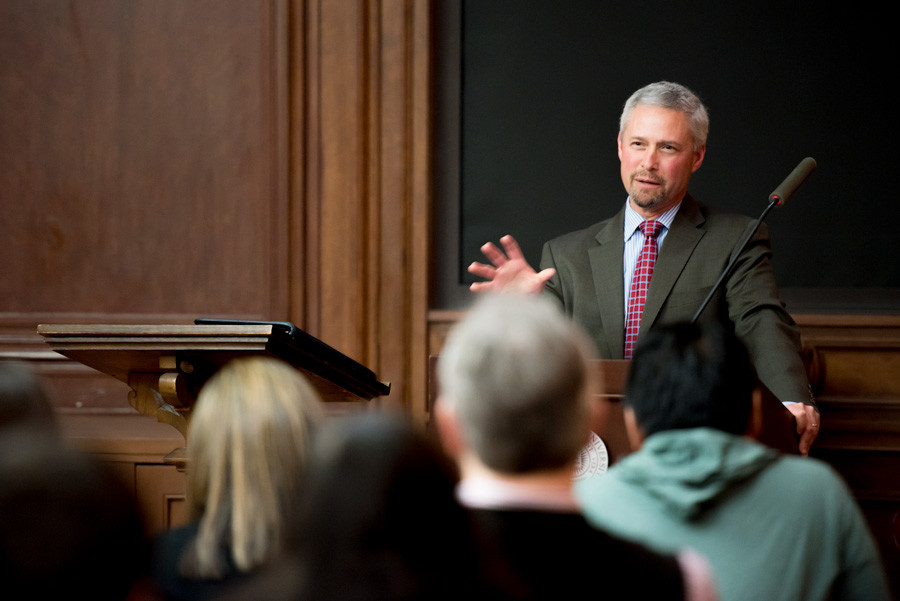Obama representative on nuclear nonproliferation encourages U.S., others to ratify nuclear test ban treaty
Zack Laurence/The Daily Northwestern
Representative for nuclear nonproliferation Adam Scheinman discusses the advantages of ratifying the Comprehensive Nuclear Test Ban Treaty. The treaty would ban all nuclear testing both above and below ground, and requires ratification from the United States among other countries.
February 2, 2016
President Barack Obama’s representative on nuclear nonproliferation spoke Wednesday on the value of adopting a nuclear test ban treaty in bringing eventual disarmament to the international community.
Adam Scheinman, who was sworn in September 2014 as the special representative for nonproliferation, spoke to a group of about 60 people on the benefits of the Comprehensive Nuclear Test Ban Treaty, a multilateral treaty from 1996 that would ban nuclear explosives for testing purposes both above and underground. The treaty was adopted about two decades ago by the United Nations but awaits ratification from several countries including the United States.
Scheinman said the treaty is a realistic first step for nonproliferation goals that are complicated and ambitious.
“(Nonproliferation) involves achieving no nuclear weapons, and that involves believing that long-simmering conflicts in regions across the world can be resolved,” Scheinman said. “We should be guided by a vision but achieve practical measures, one of which is bringing in the CTBT.”
Reducing the total of U.S. nuclear weapons while dealing with the possibility of terrorist groups acquiring nuclear material is also a necessary element to securing nuclear nonproliferation, Scheinman said. He added it is crucial to restore international faith in nonproliferation by initiating dialogue with “routinely noncompliant” states such as Iran and North Korea.
Although former president Bill Clinton signed the CTBT in 1996, the Senate rejected ratification in 1999. Critics of the treaty say it threatens the United States’ ability to maintain weapons for defense and deterrence and is not enforceable or verifiable.
Scheinman said partisan disagreement over the recent nuclear Iran Deal is one issue that impedes repairing these relationships. However, he added the absence of the U.S. ratification on the treaty is a major obstacle for other states’ compliance. A U.S. ratification would serve as an example for the rest of the world, he said, especially speaking as a nonproliferation authority.
“We don’t have a lot of moral authority to argue ‘x’ when we aren’t doing it,” he said. “States such as (China) will be hesitant to make significant moves unless the U.S. is making significant moves.”
Weinberg senior Areeba Tariq said the hypocrisy of the U.S. in not ratifying a treaty it advocates for is emblematic of a typical pattern of U.S. international politicking.
“When dealing with a global platform, you can’t promote policy without first implementing it yourself,” Tariq said. “We saw this with the convention of the rights of a child as well, and it’s really problematic.”
Tariq added that individuals fighting against policies such as the Iran Deal and nuclear disarmament ground their objections in counterproductive policy.
“We dealt Iran these sanctions that were crippling to the economy and did not lead them to comply with (International Atomic Energy Agency) checks and balances,” she said. “We can’t expect Iran to act as a rational actor if we don’t treat them as such.”
The CTBT and the Iran Deal underscore a general effort to encourage safe, non-weaponized uses of nuclear energy worldwide, Scheinman said.
However, Medill senior Sanya Mansoor said while these measures are important to implement, unsupported rhetoric by the United States hinders the ability of these policies to encourage disarmament.
“We need to pay special attention to the U.S. holding itself to the same standards, and ratifying that treaty first and foremost is a way to meet those standards,” Mansoor said.
Email: [email protected]
Twitter: @elenasucharetza


